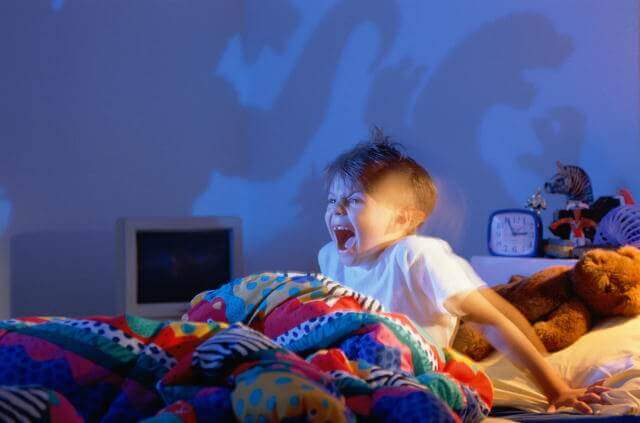What to Do if Your Children Have Nightmares

When children have nightmares and are even afraid of going to bed, how can parents help them rest?
Going to bed is something that most adults look forward to. However, that’s not always the case for children. Sometimes, kids don’t want to go to bed because they want to keep playing, while other times, it’s because they’re afraid of having nightmares.
Below, you’ll see what the most common nightmares are among children. We’ll also suggest some recommendations for calming children down after experiencing these bad dreams.
What causes children to have nightmares?
Nightmares are quite common. In fact, almost every child experiences them at some point or another. They start to appear when children are around two years old and continue through infancy.
However, by the time adulthood arrives, nightmares usually disappear altogether, except in some cases – especially with women.

There is no proven scientific reason for the existence of nightmares. There are several factors that can cause them.
Nightmares are often provoked by events that have occurred during the day, for example:
- Your child fell asleep late at night watching TV, or saw a movie that was frightening
- Bedtime stories that involve monsters or others scary things can also cause bad dreams.
- Other causes can be stressful situations that a child is facing, such as arguments, the death of a family member, changing schools, etc.
- When children aren’t used to sleeping alone, they may have nightmares more often. This is because of the fear they’re feeling.
It’s important to understand that nightmares don’t mean that your child has experienced some sort of trauma. Once again, it’s normal for children to have nightmares during infancy. So, there’s no need to reach out to a doctor or other specialist.
How can we avoid these terrible dreams?
It’s impossible to avoid nightmares altogether. However, there are things we can do to give our children a more peaceful night’s sleep and reduce the frequency of bad dreams.
To help your children get the rest they need, you can try the following suggestions:
- Establish a routine for bedtime and for mornings, and respect this routine without fail.
- Your children’s room should be as comfortable as possible, free of objects that may frighten them.
- Eat dinner early and make sure the food is light. Also, don’t allow games and activities before bed that will rile them up. Rather, help them relax. For example, you can give them a bath before bedtime, read a pleasant story, or just snuggle up.
- Give children a hot drink before bed to help them calm down and relax.
Avoid things that can upset your children, such as watching TV at night or reading scary stores. At the same time, make sure the environment in your home is as relaxed as possible.
What should I do when my children have nightmares?
Since it’s impossible to prevent nightmares altogether, all you can do is be prepared. That way, when your child wakes up distraught by a bad dream, you can help.

The first thing you can do is make sure your children feel protected. This will be much easier with your presence, which makes your children feel secure. Express words of comfort: Everything is okay, nothing’s going to happen, I’m right here.”
Tell your children that whatever they saw in their dream wasn’t real. Show them your love and comfort them so they feel that you understand them completely.
Another thing that can help them reduce their anxiety is to follow the flow of their imagination. If they tell you they’re afraid of monsters, then spray an aerosol and tell them it’s monster repellent. That way, your little ones will rest knowing they’re safe.
Also, don’t turn off the lights. If possible, place a nightlight or flashlight close to their beds.
If they have a hard time falling asleep, put on some relaxing music. In the morning, you can invite your children to tell you their dreams and listen attentively.
In conclusion, if your children have nightmares, there’s no need to worry – this is normal. What you can do is organize a decent bedtime routine and avoid tense environments.
When children have nightmares, the best thing you can do is be prepared to offer love and comfort.
When children have nightmares and are even afraid of going to bed, how can parents help them rest?
Going to bed is something that most adults look forward to. However, that’s not always the case for children. Sometimes, kids don’t want to go to bed because they want to keep playing, while other times, it’s because they’re afraid of having nightmares.
Below, you’ll see what the most common nightmares are among children. We’ll also suggest some recommendations for calming children down after experiencing these bad dreams.
What causes children to have nightmares?
Nightmares are quite common. In fact, almost every child experiences them at some point or another. They start to appear when children are around two years old and continue through infancy.
However, by the time adulthood arrives, nightmares usually disappear altogether, except in some cases – especially with women.

There is no proven scientific reason for the existence of nightmares. There are several factors that can cause them.
Nightmares are often provoked by events that have occurred during the day, for example:
- Your child fell asleep late at night watching TV, or saw a movie that was frightening
- Bedtime stories that involve monsters or others scary things can also cause bad dreams.
- Other causes can be stressful situations that a child is facing, such as arguments, the death of a family member, changing schools, etc.
- When children aren’t used to sleeping alone, they may have nightmares more often. This is because of the fear they’re feeling.
It’s important to understand that nightmares don’t mean that your child has experienced some sort of trauma. Once again, it’s normal for children to have nightmares during infancy. So, there’s no need to reach out to a doctor or other specialist.
How can we avoid these terrible dreams?
It’s impossible to avoid nightmares altogether. However, there are things we can do to give our children a more peaceful night’s sleep and reduce the frequency of bad dreams.
To help your children get the rest they need, you can try the following suggestions:
- Establish a routine for bedtime and for mornings, and respect this routine without fail.
- Your children’s room should be as comfortable as possible, free of objects that may frighten them.
- Eat dinner early and make sure the food is light. Also, don’t allow games and activities before bed that will rile them up. Rather, help them relax. For example, you can give them a bath before bedtime, read a pleasant story, or just snuggle up.
- Give children a hot drink before bed to help them calm down and relax.
Avoid things that can upset your children, such as watching TV at night or reading scary stores. At the same time, make sure the environment in your home is as relaxed as possible.
What should I do when my children have nightmares?
Since it’s impossible to prevent nightmares altogether, all you can do is be prepared. That way, when your child wakes up distraught by a bad dream, you can help.

The first thing you can do is make sure your children feel protected. This will be much easier with your presence, which makes your children feel secure. Express words of comfort: Everything is okay, nothing’s going to happen, I’m right here.”
Tell your children that whatever they saw in their dream wasn’t real. Show them your love and comfort them so they feel that you understand them completely.
Another thing that can help them reduce their anxiety is to follow the flow of their imagination. If they tell you they’re afraid of monsters, then spray an aerosol and tell them it’s monster repellent. That way, your little ones will rest knowing they’re safe.
Also, don’t turn off the lights. If possible, place a nightlight or flashlight close to their beds.
If they have a hard time falling asleep, put on some relaxing music. In the morning, you can invite your children to tell you their dreams and listen attentively.
In conclusion, if your children have nightmares, there’s no need to worry – this is normal. What you can do is organize a decent bedtime routine and avoid tense environments.
When children have nightmares, the best thing you can do is be prepared to offer love and comfort.
All cited sources were thoroughly reviewed by our team to ensure their quality, reliability, currency, and validity. The bibliography of this article was considered reliable and of academic or scientific accuracy.
- Morales, E. M., & Narváez, P. M. (2004). Tratamientos psicológicos de las pesadillas: Una revisión. International Journal of Psychology and Psychological Therapy. https://doi.org/10.1016/j.jconrel.2012.06.039 [doi]
- Covertini, G., Krupitzky, S., Tripodi, M. R., & Carusso, L. (2003). Trastornos del sueño en niños sanos. Arch.Argent.Pediatr.
- Aldana, A., Samudio Domínguez, G. C., Irala, E., & Rodas, N. (2006). Trastornos del sueño: prevalencia en población pediátrica en edad preescolar y escolar de área urbana. Pediatría (Asunción): Organo Oficial de La Sociedad Paraguaya de Pediatría.
This text is provided for informational purposes only and does not replace consultation with a professional. If in doubt, consult your specialist.








